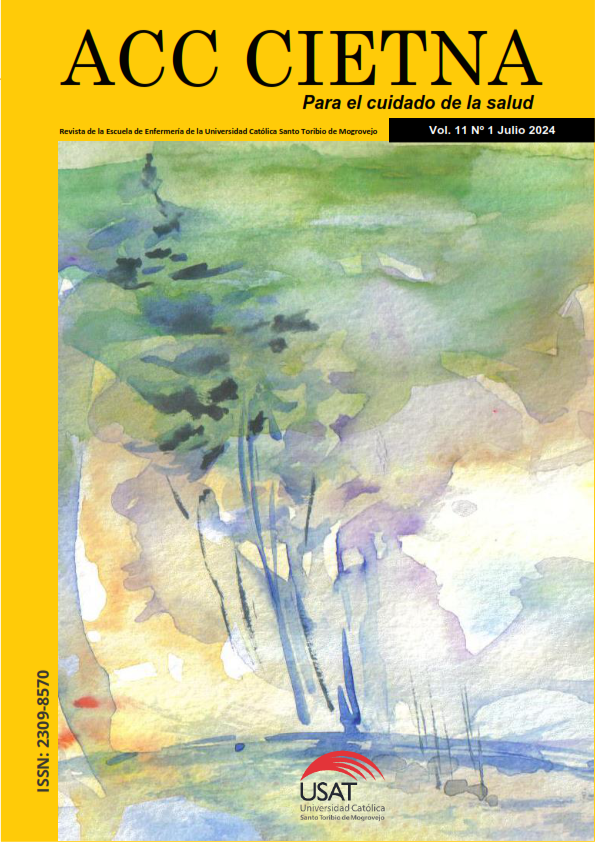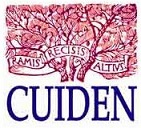Effectiveness of simulated training in nursing students: A systematic review
Abstract
Objective: Analyze the scientific evidence on the effectiveness of simulated training in nursing students. Method: Through a search for original articles between the years 2015 to 2023 in the PubMed, Scopus, Embase, Web of Science and BVS databases, in Spanish, Portuguese and English, using the terms “nursing teachers”, “simulated training” and “nursing students”. Main results: After collecting, analyzing and filtering the research were framed in the following themes: application of simulators, the most used, the advantages, challenges and their usefulness in universities. General conclusion: The application of clinical simulators in teaching turns out to be an effective, attractive and updating strategy for nursing students, the most used are the low fidelity ones; The advantages are the development of reflective thinking and psychomotor skills of students, which improves their safety and that of the patient; The challenges to overcome are the high costs in its acquisition and maintenance, poor practice by teachers in its use and experiences of stress in the student; Their usefulness in universities is broad but limited as they are not included in the curriculum as part of the laboratory and there are teachers who are not trained in their use.
Downloads
References
Quirós SM, Vargas MA de O. Clinical Simulation: a strategy that articulates teaching and research practices in nursing. Enfermagem [Internet]. 2014 Dec [citado 18 Dic 2023]; 23(4): 815–6. Disponible en: https://bit.ly/3RuxAOp
Quesada A, Burón FJ, Castellanos A, Moral I, González C, Olalla JJ, Rabanal J, Rodríguez J, Teja J. Formación en la asistencia al paciente crítico y politraumatizado: papel de la simulación clínica. Medicina Intensiva [Internet]. 2007 May 1 [citado 18 Dic 2023]; 31(4):187–93. Disponible en: https://scielo.isciii.es/scielo.php?script=sci_arttext&pid=S0210-56912007000400005
Bolón A. Onetti francés. Estudios de lengua, literatura y civilización francesa en Onetti [Internet]. [citado 18 Dic 2023]. Disponible en: https://www.csic.edu.uy/sites/csic/files/publicacion5b896eea24c422.23929742.pdf
Guerra F. C, Carrasco A. P, García J. N. El rol de la simulación en el aprendizaje de habilidades procedimentales en estudiantes de enfermería: historia y desafíos. Revista médica de Chile. 2022 Feb [citado 18 Dic 2023]; 150(2): 216–21. Disponible en: https://www.scielo.cl/scielo.php?script=sci_arttext&pid=S0034-98872022000200216
Simulation Training. Psnetahrqgov [Internet]. 2019 Sep 7 [citado 18 Dic 2023]. Disponible en: https://psnet.ahrq.gov/primer/simulation-training
Simulación Clínica [Internet]. SEMES. Disponible en: https://www.semes.org/gdt/simulacion-clinica/
Arriola de Pimentel GU. La simulación clínica en la enseñanza de la medicina. Horizonte Médico (Lima) [Internet]. 2022 Mar [citado 18 Dic 2023]; 22(1):e1766. Disponible en: https://bit.ly/3tkAldb
Bruce R, Levett-Jones T, Courtney-Pratt H. Transfer of Learning From University-Based Simulation Experiences to Nursing Students’ Future Clinical Practice: An Exploratory Study. Clinical Simulation in Nursing [Internet]. 2019 Oct [citado 18 Dic 2023]; 35(35): 17–24. Disponible en: https://www.nursingsimulation.org/article/S1876-1399(19)30091-X/fulltext
Pretty MI, Moreno RN, González MC, Díaz AH, Osorio LG. Simulación clínica: opinión de estudiantes de enfermería, Universidad Autónoma de Chile, Temuco. Enfermería: Cuidados Humanizados [Internet]. 2019 [citado 17 Oct 2023]; 8(2): 89–116. Disponible en: https://revistas.ucu.edu.uy/index.php/enfermeriacuidadoshumanizados/article/view/
Urra Medina E, Sandoval Barrientos S, Irribarren Navarro F. El desafío y futuro de la simulación como estrategia de enseñanza en enfermería. Investigación en Educación Médica [Internet]. 2017 [citado 17 Oct 2023]; 6(22): 119–25. Disponible en: https://www.sciencedirect.com/science/article/pii/S2007505717301473
Hayden J, Smiley R, Alexander M, Kardong-Edgren S, Jeffries P. The NCSBN National Simulation Study: A Longitudinal, Randomized, Controlled Study Replacing Clinical Hours with Simulation in Prelicensure Nursing Education. Journal of Nursing Regulation. 2014 Jul;5(2): S3–40. Disponible en: https://www.journalofnursingregulation.com/article/S2155-8256(15)30062-4/fulltext
Fernández-Sánchez H, King K, Enríquez-Hernández CB. Revisiones Sistemáticas Exploratorias como metodología para la síntesis del conocimiento científico. Enferm Univ [Internet]. 2020 [citado 18 Dic 2023]; 17(1). Disponible en: https://bit.ly/3Txo3sI
Kahriman I, Öztürk H, Bahcecik N, Sökmen S, Kücük S, Calbayram N, et al. The effect of theoretical and simulation training on medical errors of nurse students in Karadeniz Technical University, Turkey [Internet]. 2018 [citado 18 Dic 2023]; 68(11): 1636 – 1643. Disponible en: https://core.ac.uk/download/pdf/227074543.pdf
Lockertsen Ø, Løvhaug L, Davik NK, Bølgen BR, Færden A, Skarstein S. Second-year undergraduate nursing students’ experiences with clinical simulation training in mental health clinical practice: A focus group study. Nurse Education in Practice. 2023 [citado 18 Dic 2023]; 66: 103534. Disponible en: http://dx.doi.org/10.1016/j.nepr.2022.103534
Kol E, Ince S, Işik RD, Ilaslan E, Mamakli S. The effect of using standardized patients in the Simulated Hospital Environment on first-year nursing students psychomotor skills learning. Nurse Education Today. 2021 [citado 18 Dic 2023]; 107: 105147. Disponible en: https://doi.org/10.1016/j.nedt.2021.105147
Vural Doğru B, Zengin Aydın L. The effects of training with simulation on knowledge, skill and anxiety levels of the nursing students in terms of cardiac auscultation: A randomized controlled study. Nurse Education Today. 2020 [citado 18 Dic 2023]; 84: 104216. Disponible en: https://doi.org/10.1016/j.nedt.2019.104216
Sarabia-Cobo CM, Alconero-Camarero AR, Lavín-Alconero L, Ibáñez-Rementería I. Assessment of a learning intervention in palliative care based on clinical simulations for nursing students. Nurse Education Today. 2016 [citado 18 Dic 2023]; 45: 219–24. Disponible en: https://doi.org/10.1016/j.nedt.2016.08.014
Tuzer H, Dinc L, Elcin M. The effects of using high-fidelity simulators and standardized patients on the thorax, lung, and cardiac examination skills of undergraduate nursing students. Nurse Education Today. 2016 Oct [citado 18 Dic 2023]; 45: 120–5. Disponible en: https://doi.org/10.1016/j.nedt.2016.07.002
Park J, Kim KJ. Effects of patient deterioration simulation using inattentional blindness for final year nursing students: A randomized controlled trial. Nurse Education Today. 2021 Nov [citado 18 Dic 2023]; 106: 105080. Disponible en: https://doi.org/10.1016/j.nedt.2021.105080
Everett-Thomas R, Joseph L, Trujillo G. Using virtual simulation and electronic health records to assess student nurses’ documentation and critical thinking skills. Nurse Education Today. 2021 [citado 18 Dic 2023]; 99: 104770. Disponible en: https://doi.org/10.1016/j.nedt.2021.104770
Interprofessional simulation education to enhance teamwork and communication skills among medical and nursing undergraduates using the Team STEPPS® framework. Medical Journal Armed Forces India [Internet]. 2021 [citado 18 Dic 2023]; 77: S42–8. Disponible en: https://www.sciencedirect.com/science/article/pii/S0377123720302306
Lee Bih-O, Liang HF, Chu TP, Hung CC. Effects of simulation-based learning on nursing student competences and clinical performance. Nurse Education in Practice. 2019 [citado 18 Dic 2023]; 41: 102646. Disponible en: https://doi.org/10.1016/j.nepr.2019.102646
Breen D, O’Brien S, McCarthy N, Gallagher A, Walshe N. Effect of a proficiency-based progression simulation programme on clinical communication for the deteriorating patient: a randomised controlled trial. BMJ Open. 2019 [citado 18 Dic 2023]; 9(7): e025992. Disponible en: https://doi.org/10.1136/bmjopen-2018-025992
Abelsson A, Bisholt B. Nurse students learning acute care by simulation – Focus on observation and debriefing. Nurse Education in Practice. 2017 [citado 18 Dic 2023]; 24: 6–13. Disponible en: https://doi.org/10.1016/j.nepr.2017.03.001
Lestander Ö, Lehto N, Engström Å. Nursing students’ perceptions of learning after high fidelity simulation: Effects of a Three-step Post-simulation Reflection Model. Nurse Education Today. 2016 [citado 18 Dic 2023]; 40: 219–24. Disponible en: https://doi.org/10.1016/j.nedt.2016.03.011
Sundler AJ, Pettersson A, Berglund M. Undergraduate nursing students’ experiences when examining nursing skills in clinical simulation laboratories with high-fidelity patient simulators: A phenomenological research study. Nurse Education Today. 2015 [citado 18 Dic 2023]; 35(12): 1257–61. Disponible en: https://doi.org/10.1016/j.nedt.2015.04.008
Liaw SY, Chan SWC, Chen FG, Hooi SC, Siau C. Comparison of Virtual Patient Simulation With Mannequin-Based Simulation for Improving Clinical Performances in Assessing and Managing Clinical Deterioration: Randomized Controlled Trial. Journal of Medical Internet Research [Internet]. 2014 [citado 18 Dic 2023]; 16(9): e214. Disponible en: https://www.ncbi.nlm.nih.gov/pmc/articles/PMC4180357/
Alconero-Camarero AR, Sarabia-Cobo CM, Catalán-Piris MJ, González-Gómez S, González-López JR. Nursing Students’ Satisfaction: A Comparison between Medium- and High-Fidelity Simulation Training. International Journal of Environmental Research and Public Health. 2021 [citado 18 Dic 2023]; 18(2): 804. Disponible en: https://doi.org/10.3390/ijerph18020804
Copyright (c) 2024 Liz Mery Fuentes Galvez

This work is licensed under a Creative Commons Attribution 4.0 International License.
Los autores conservan los derechos de autor.
Esta obra está bajo una licencia internacional Creative Commons Attribution 4.0.
Los artículos publicados por la revista científica "Acc Cietna: para el cuidado de la salud" de la Escuela de Enfermería de la Universidad Católica Santo Toribio de Mogrovejo, Chiclayo, Perú están sujetos a una licencia internacional Creative Commons Attribution CC BY 4.0.




















 BIBLIOTECA USAT
BIBLIOTECA USAT